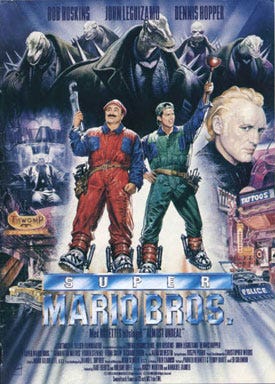Sony Pictures Digital's Yair Landau oversees both Sony Pictures Animation (Surf's Up) and Sony Online Entertainment (EverQuest), and talks to Gamasutra about how convergence is significantly affecting the bond between Hollywood and the game industry, from 300 to The Agency.
December 27, 2007

Author: by John Gaudiosi
Yair Landau is President of Sony Pictures Digital Entertainment (SPDE), an operating unit of Sony Pictures Entertainment, which he formed in 1999 to bring together Sony Pictures' digital artists, technologists and production software engineers to create exceptional digital entertainment for audiences around the world.
SPDE consists of Sony Pictures Imageworks, Sony Pictures Animation and Sony Online Entertainment. The division produces stories, characters, images and games conceived, created and rendered digitally. Landau talked about his company and the convergence of Hollywood and games in this exclusive interview conducted earlier this year.
What was your interest in getting involved in online video games?
Yair Landau: I think that from a Sony Pictures standpoint, as Sony's audio/visual arm there was a natural extension of why Sony's in the picture interest. Sony was already in the games business and we created a lot of our own original characters and stories, and the online games business is a natural extension of that. More specifically, we saw the online games space as part of the emerging communities online and that's a business that we wanted to get in.
How have you seen new game console introductions impact Hollywood's involvement with games?
YL: What we see is as the power of the game platforms grow, the opportunity to have an experience in the game world is more like watching a movie. Obviously, Sony has fueled a lot of that and driven that by increasing processing power with PlayStation 3 and allowing us to render greater stories and greater images and deeper gameplay experiences. We have certainly been driven in part by that, but the whole game industry has been driven in part by that. Games have become a richer, deeper experience and they've become more of a mass experience.
How have you seen Hollywood influence games?
YL: I think there have been a series of steps. I'd say the largest step, in my mind, from the impact of Hollywood on the games business, would have to be Saving Private Ryan. That movie gave birth to a whole genre of video games across a series of publishers and a series of platform. Starting with Medal of Honor and moving on to Call of Duty, Brothers in Arms, and Battlefield 1942.
Basically, Saving Private Ryan gave birth to a genre of gameplay. You could say there were shooter games before, but really the whole World War II game experience is more than just a shooter experience. It's a role-playing experience in a specific context that enhances the shooter experience. In my mind, that's the first time that you've seen a great Hollywood experience translated into a mass game experience.
What about games impacting Hollywood?
YL: I would say Resident Evil is probably the single best original game to become a movie and a lot of that is because the movie is true to the kicking-zombie-butt gameplay style. Milla Jovovich is just encapsulating the persona in that film. Even so, Resident Evil is a smaller-scale success.
We've yet to see a game truly spawn a movie on the caliber of the game. In the sense that, to pick an example of Madden: The Movie, where you have a seminal game experience that's defined a genre and which has attracted a giant movie audience. We haven't seen that result in a parallel movie experience yet.
But is that something you would expect to happen?
YL: I think that it's something that will happen. I actually think that the phenomenon of 300 is really, in fact, a manifestation of the video game experience in kind of the collective conscience. The audience who came to see 300 was weaned on video games and what they saw in the marketing materials for 300 was a similar experience. They didn't show up because they were interested in the Spartans, or because they read Herodotus, or because they thought the Battle of Thermopylae was a great, untold story.
They showed up because they saw a movie experience that was the most similar to the game experiences that they've grown up playing. The movie works because it's violent and it's actually very video game-ish. Even though it's based on a graphic novel, the execution of that graphic novel was more to video games and so you could say 300 is the first video game movie translation even though it's not really based on a video game.
 Why did the Super Mario Bros. movie fail?
Why did the Super Mario Bros. movie fail?
YL: That game is a very simple experience. It's just really fun and funny. And it's not a character-based experience. It's not a story. It's a series of one-off, random comedic experiences. Creating a plot around that and giving Mario a personality is just a tough thing to do. Plus, the movie was poorly executed.
Why do you think Lara Croft was able to have some success?
YL: Lara Croft had some success because Angelina Jolie as a physical manifestation of Lara Croft was really compelling to the audience. I don't think that it captured a lot of the ingenuity of Lara Croft, but I think that it was an embodiment for the audience of the character that a lot of the audience thought was appropriate.
I also think that part of the joy of playing the Lara Croft games is watching Lara Croft and the same thing held true for the movie. There's a certain joy in watching Angelina Jolie. I suppose there is also some joy in playing Angelina Jolie, but I haven't seen that in a game format. The point is that they are two different experiences. There is the interactivity of playing the character and having that experience in your imagination and then there is the other aspect of it, which is watching that character go through a story arc.
They did less of a good job of that, that's why I think it hasn't sustained itself. If you matched Lara Croft up to Indiana Jones there is no comparison because Indiana Jones is a compelling character going through a great story arc. Lara Croft was a potentially compelling character going through an okay story arc.
What are the difficulties of bringing a game to life?
YL: Well, it's actually a difficulty that exists with every movie. You have to create a series of compelling characters, especially your lead. And you have to create a compelling story that gets people to feel and gets people immersed in the story and in the experience of that character. When you are starting with a video game, you are starting with a context but you're not starting with a character that really has an arc and humanity and empathy. So you have to write that for the character for the movie.
Games also don't have a complex story with emotional turns in a classic three-act story structure. The audience, to a large extent, demands a beginning, middle, and an end when they go to a movie. A game doesn't have the same structure because there are a series of escalations. There's a trial and error, there is an interactivity that is very different than -- here's how the story opens, here's what happens in the middle and here's how it concludes.
Reversing that, the question is: did you create a world in your movie that's compelling for the audience to engage in by themselves? We have a game right now at Sony Online Entertainment called The Agency, which taps into appeal of the espionage genre. Alias, James Bond, the Bourne films, and 24 each have put their own stamp on spy thrillers.
We're putting our own fresh twist on the genre with The Agency by creating an online game in which players actually step into the role of a fledgling agent in a mercenary world. We're stretching the MMO genre with this game and breaking out of the "men in tights" world and introducing the "men in tuxedos with silencers world." What Alias or James Bond or the Bourne films do is create an espionage world, which is a very interesting context for the game player to actually exist in.
What has the video game industry learned from Hollywood?
YL: I think that the video game industry has applied a lot of techniques of filmmaking into the game experience to make it more visceral and to make it more real. I'd say the first one is cinematography. If you look at the evolution of the video game business -- of the video game experience -- the whole notion of the first-person shooter category evolved as a function of somebody saying, "Oh, look, first-person camera, I can give you a different emotional experience." I don't think they said, "Oh, I'm copying something I saw in horror films." But there are certainly a lot of slasher movies with first-person camera where you saw Jason from his point-of-view as he was about to kill somebody by the campfire.
You saw that on film before you saw it in Doom. What they did in Doom was take that first-person camera technique and apply it to the shooter genre and then upped it a notch. And so cinematography, basic environmental design, basic character design -- a lot of essential effects that make the game experience more real -- come from people looking at movies and saying, "I want to translate that experience into my game," whether they do it consciously or subconsciously.

The big screen adaptation of id's FPS classic, Doom
How have video game marketers mirrored Hollywood?
YL: Certainly, one of the things Hollywood does really effectively is sell you on a story in 30 seconds, or 60 seconds, or two-and-a-half minutes, depending on the format. Game publishers selling video games through trailers or 30-second spots definitely borrows from Hollywood. But I think that for the most part, that isn't what sells video games. What sells movies to a large extent is word-of-mouth. You can have a opening weekend in either business, but the reason Halo 3 and Halo 2 before it had huge opening weekends was because Halo is a great gameplay experience not because they cut a bunch of really cool spots.
What are your thoughts on Hollywood actors migrating to games?
YL: I think you'll see more of this because it's a much larger medium, so there's an economic opportunity for them and many of these actors actually play games. With Surf's Up, we had a partnership with Ubisoft for a game. A lot of our cast was pretty young, Shia LaBeouf, Zooey Deschanel and Jon Heder, and they were glad to voice themselves in the game because they wanted to play the game themselves. So I think that there's that aspect of it.
Also, from an animation standpoint, when you voice a character, you create a character games are a great extension opportunity. The translation of animation from film to game is a little bit purer because it's a digital character to begin with. So if you are Cody Maverick, our hero in Surf's Up, he looks the same in the game as he does in the movie.
Read more about:
FeaturesYou May Also Like





